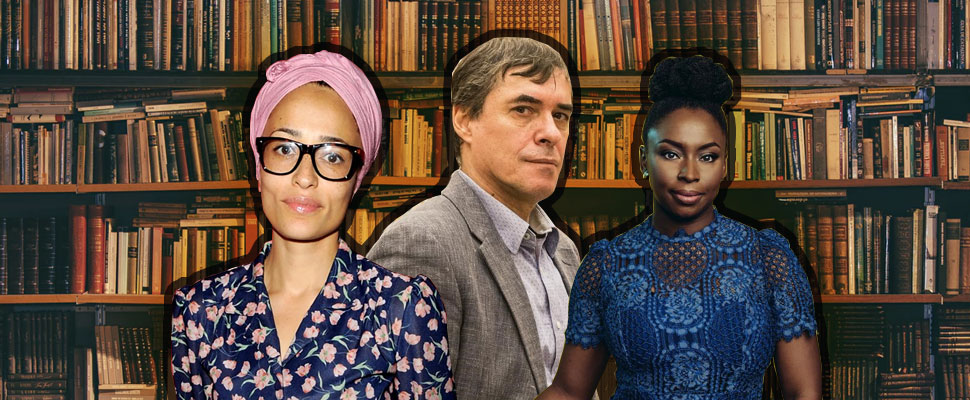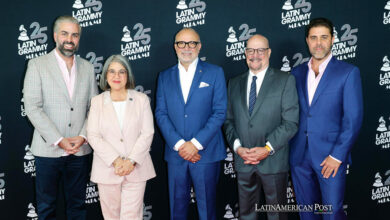An English, a Romanian and a Nigerian: three writers you should know
Listen this article
As part of the Hay Festival in Colombia, Zadie Smith, Mircea Cartarescu and Chimamanda Ngozi Adichie visited the country. Who are they?

The Hay festival has been established, during its fourteen years of existence, as one of the most important cultural diffusion events in Latin America. On this occasion, the members of its curatorship managed to bring the writers Zadie Smith, Mircea Cartarescu and Chimamanda Ngozi Adichie. Three writers of very diverse origins.
Leer en español: Una inglesa, un rumano y una nigeriana: tres escritores que debes conocer
What could unite these writers from such diverse geographies and why bring them to Colombia? Next, we present a profile of them.
Zadie Smith
Born in London in 1975, the daughter of an English photographer and a Jamaican model, Smith is the product of multiculturalism in England. During her childhood, she lived in a working-class neighborhood, a place where people of all possible origins and cultures intermingled. When she was older, she studied English literature in Cambridge.
Read also: Hay Festival begins!
As Arcadia explains, at that time she wrote her first fiction stories that came into the hands of Simon Prosser, editorial director of Hamish Hamilton, who offered her an advance of 250,000 pounds to write her first novel.
With only 24 years she published White Teeth, an instant success with which she won prizes such as the Guardian First Book Award. "An amazingly safe, fun and serious debut […] I loved it," said Salman Rushdie, winner of the Booker Prize. This book has been followed by The autograph man (2002), On beauty (2005) and Swing Time (2016), among others.
Both in her interview with Arcadia and El Tiempo during her stay in Colombia, she highlighted her distrust of technology, of the human in the digital age. In the first magazine, she said "I am not a digital native, I will never be one, and I have decided not to be one. It was a choice," and to El Tiempo, she said: "I think technology has convinced people that they are doing something they are not doing: connecting with millions and having a very busy and active life." Even in The Guardian, she said "I can't stand cell phones, and I do not want them in my life in any way. They make me feel anxious, depressed, dead inside, unstable, etc."
Mircea Cartarescu
In 1956 this Romanian writer was born in Bucharest with his twin brother, who would die a year and a half later. This fact, as he affirmed in the conversation with Piedad Bonnet in the Gimnasio Moderno, gives shape to one of his obsessions: the double, either the dream as the double of the reality, or the reflection in the mirror as the double of the own body.
He spent his adolescence among books in the public library of his neighborhood, where he claims to have read them all. He later studied Romanian literature at the University of Bucharest and in 1999 he obtained his doctorate. During all that time, specifically from the age of 17, he claims to have written in his diary almost every day, where he has the seed of all his stories.
In his early years he devoted himself to writing poetry, eight books exactly whose last link is Nothing (Nimic in Romanian) after which he abandons the verses. As he stated in an interview to The Reason of Spain, "When I wrote the last poem of "Res" I decided to commit suicide as a poet to start another life in literature. I got my poetry to commit suicide because I remained a poet, something I see today, now."
When he abandons poetry, he turns to prose with The Roulette Player, a story that made him visible in the literary world to which he would follow books such as Travesti (1994), Beautiful Strangers (2010) and Solenoid (2015), his great work, between others.
During his visit to Colombia, he confirmed his admiration for García Márquez, who he affirms in an interview for El Tiempo: "I do not think there is anyone who can imitate or analyze it critically. One hundred years of solitude is a book of pure perfection." He also spoke about the similarities between Romania and Colombia, since "Our language is also of Roman Latin origin, and we are also fascinated, and we love all dictators and all tyrants, we are like you have a very large gap between the rich and the poor" says the viewer of the conversation in Cartagena with Xavi Ayén.
Chimamanda Ngozi Adichie
Recognized on the internet for her talks by Ted 'The danger of a single story' and 'We should all be feminists,' the Nigerian writer is the youngest of the three. In 1977 she was born in Enugu, Nigeria, then her parents moved to Nsukka, where she would spend her childhood and adolescence. After studying medicine for a while, she went to the United States to study communication and political science at the Eastern Connecticut State University, which ends in 2001. She also completed a master's degree in creative writing at John Hopkins University.
As The New York Times explains, Adichie published her first book, Purple Hibiscus (2003), with which she won the First Book of the Commonwealth Writer's Prize. Her second book, Half of a Yellow Sun (2006), talks about the civil war in Nigeria and opened the way for him to win a Mcarthur scholarship, with which he wrote The Thing Around Your Neck (2009), a storybook. Finally, in 2013, he published Americanah, a story about family and immigration set in Nigeria and New Jersey. With this last one, she won the National Book Critics Circle, in addition to being a sales success.
Her work is characterized by dealing with issues of race and gender. On the fact of being a feminist woman, in an interview with Arcadia she states that "There is a feminist discourse in the West with which I do not really feel connected […] What I strongly believe in is a wide range of possible images for women . I think women should be what they want to be. There are women disinterested in certain subjects ". For this reason, her public figure has emphasized in expressing femininity of which she expresses "I have a very active mental life, but I also enjoy dresses and heels and all those issues."
During her visit to Colombia, she attended a conversation with Alma Guillermoprieto and another with Aurora Vergara in the framework of Hay Comunitario. The latter was carried out in the Nelson Mandela neighborhood, whose population is mostly Afro-descendant, forty minutes from the historic center. As Arcadia points out, the writer affirmed when she arrived "I am happy to be in the black Cartagena, the real Cartagena." On her relationship with Colombia, she added, "One of the reasons I am so happy to be in Colombia, in Latin America, is because as an African I feel a connection with this continent, and that is because Africa is here. Africa is in the DNA of America." Thus, she made specific her interest in the African diasporas in Latin America, not only to her interlocutor but also to the inhabitants of the neighborhood who went to hear it.
LatinAmerican Post | Juan Gabriel Bocanegra
Translated from "Una inglesa, un rumano y una nigeriana: tres escritores que debes conocer"





